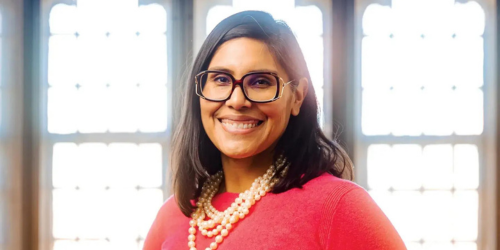├█╠ĎË░¤˝AV alum Tana Fitzpatrick begins new role on all three University of Oklahoma campuses
by Brian Daffron

Tana Fitzpatrick found herself in a difficult position during the COVID-19 pandemic. She and her young family lived in Washington, D.C., a long way from the Norman area in which she grew up. Working for the Congressional Research Service in the Library of Congress as a natural resources policy specialist, Fitzpatrick knew that she needed to return to family.
ÔÇťWe didnÔÇÖt have any family support out there,ÔÇŁ Fitzpatrick said about living in D.C. during that time. ÔÇťIt really highlighted to us how desperately we needed to be closer to our culture and our family.ÔÇŁ
Fitzpatrick, an enrolled member of the Crow Tribe of Montana, is also descended from the Lakota, Ponca and Chickasaw Nations. She grew up traveling miles from Norman to attend ceremonials such as the Lakota Sun Dance, Ponca Powwow and the Kiowa Tia Piah Society dances. With Washington, D.C, being miles away from these tribesÔÇÖ ceremonial and social events, it made it difficult for she and her significant other, also an enrolled member of the Crow Tribe of Montana, to visit family. After making the decision to move, the University of Oklahoma hired Fitzpatrick to become the inaugural associate vice president of tribal relations. Her office covers not only the University of OklahomaÔÇÖs Norman campus, but also the OU Health Sciences Center and the OU-Tulsa campus.
In addition to her experiences with the Library of Congress, Fitzpatrick also has served as an attorney for the Gila River Indian Community in Arizona, a senior counselor to the assistant secretary for Indian Affairs, a program examiner for the Office of Management and Budget, and a staff attorney for the National Indian Gaming Association.
One of the major steps to her journey as an academic vice president includes her bachelorÔÇÖs degrees in political science and Spanish at ├█╠ĎË░¤˝AV in 2004, as well as her juris doctor from Arizona State University in 2008. Fitzpatrick said that although she was a second-generation college student, she didnÔÇÖt have her majors all figured out at the beginning. It was a close friend, the late Leo Blades, who got her involved with the Oklahoma Intercollegiate Legislature.
ÔÇťThat altered the trajectory,ÔÇŁ she said. ÔÇťIt gave me a sense of purpose of what I wanted to do. As I was learning more about political science, I started really pulling on my own traditions. My dadÔÇÖs a big influence. I love environmental law and how it intersects with Indian law. He was always a big influence on me in honoring Mother Earth, of course, honoring our traditionsÔÇömy mom too. Once I graduated from ├█╠ĎË░¤˝AV, I knew at that point I wanted to go to law school, and I only really wanted to go to programs that offered an Indian law certificate.ÔÇŁ
Yet what made FitzpatrickÔÇÖs ultimate decision to attend ├█╠ĎË░¤˝AV was the universityÔÇÖs direct family connection to her grandfather, Rev. Thomas Roughface, a United Methodist minister of the Oklahoma Indian Missionary Conference. Fitzpatrick was present when ├█╠ĎË░¤˝AV awarded him his doctoral degree.
Professionally, whether it is on a university campus or in the courtroom, Fitzpatrick sees her current public service role as a facilitator between university representatives and tribal governments.
ÔÇťLetÔÇÖs say itÔÇÖs a faculty member who wants to make contact with a tribe on a program or a grant or a speaking engagement,ÔÇŁ Fitzpatrick said. ÔÇťWhatever it might be, they want assistance in outreach to tribal nations or vice-versa. If a tribe wants to have some sort of engagement with the university that doesnÔÇÖt know who to go to, then I want them to know that they can come to me, and I will help facilitate that connection.ÔÇŁ
